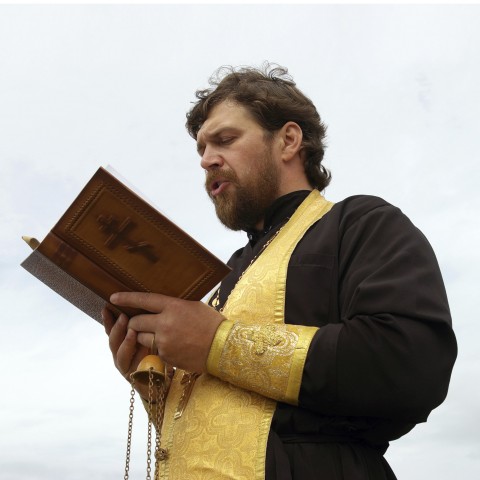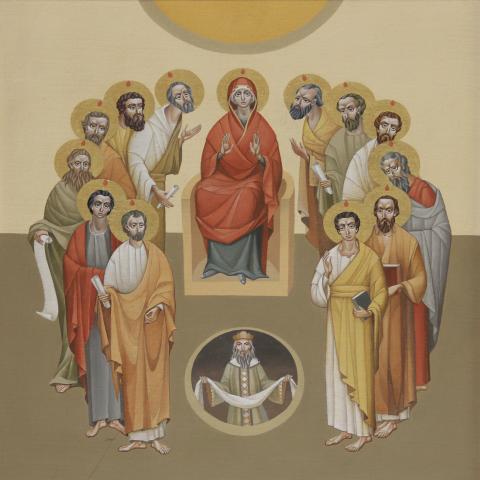The Pentecostal holiday of Whit Monday (also called “Monday of the Holy Spirit” or “Pentecost Monday”) is a vital celebration in Greek culture. The Greek Church actually separated the celebrations of this holiday from those of Pentecost, to ensure that its meaning and significance are always recognized despite commemorating the same events.
By learning about the Whit Monday holiday, you’re also going to learn lots about Greek culture and values. Any successful language-learner can tell you that this is a fundamental step in actually mastering a language: Comprehending its culture.
And at GreekPod101.com, we hope to make this learning experience enjoyable and informative!
1. What is Whit Monday in Greece?
So, what is Pentecost Monday, as opposed to the Day of Pentecost?
Although Monday of the Holy Spirit is based on the same events as the ones of the Day of Pentecost, the Greek Church ensured that the Holy Spirit’s splendor wasn’t forgotten as one of three parts of the Trinity. To do so, it decided to split the two holidays.
This holiday celebrates the descension of the Holy Spirit onto earth, one of the most important aspects of the Christian faith.
2. When is Monday of the Holy Spirit?
The date of Monday of the Holy Spirit varies each year, as it always takes place fifty days after Easter. For your convenience, here’s a list of this holiday’s date for the next ten years.
- 2019: June 17
- 2020: June 8
- 2021: June 21
- 2022: June 13
- 2023: June 5
- 2024: June 24
- 2025: June 9
- 2026: June 1
- 2027: June 21
- 2028: June 5
3. Reading Practice: Monday of the Holy Spirit Traditions
How is Monday of the Holy Spirit celebrated in Greece?
This day is important to our Church because we “receive” the Holy Spirit, which always guides us to the greater good. Customs for Monday of the Holy Spirit vary from region to region. For example, on the island of Limnos, it’s custom to gather herbs like chamomile and sage for their therapeutic properties. In the olden days, people believed that this day was a “bad time,” meaning that bad things could happen, and for this reason, they were extremely careful. For example, people avoided going near the sea.
Read the Greek text below to learn all about unique Greek traditions, from region to region, for the Whit Monday holiday. You can find the English translation directly below it.
—
Στη Σμίξη των Γρεβενών οι γυναίκες μοιράζουν πίτες, γλυκά και εφτάζυμο ψωμί με μυρωδικά. Στην Αλιμπίστα Αιτωλοακαρνανίας στήνεται πρωινό πανηγύρι. Μετά τη Θεία Λειτουργία, όλοι σχηματίζουν ουρά μπροστά από τον πλανόδιο χασάπη, ο οποίος κόβει ψητά αρνιά με τον μπαλτά. Πολλοί φέρνουν πίτες, τυριά και άλλα φαγητά για να συμπληρώσουν το γεύμα. Οι ρίζες του πανηγυριού αυτού χάνονται στον χρόνο και πολλοί δεν αποκλείουν το έθιμο αυτό να αποτελεί εξέλιξη ενός αρχαίου εθίμου, που σχετίζεται με την ανατολή του ηλίου και τη λατρεία του θεού Απόλλωνα.
Στον Βώλακα Δράμας το πρωί, νέοι με στολισμένα άλογα και μουλάρια ξεκινάνε για το ξωκλήσι του Αγίου Πνεύματος από την πλατεία του χωριού, ανεβαίνοντας το όρος «Φαλακρό». Ακολουθεί δοξολογία και πανηγύρι, όπου τρώνε το «κουρμπάνι», ένα παραδοσιακό φαγητό από κατσικάκι βραστό με χορταρικά. Έπειτα όλοι επιστρέφουν στην πλατεία του χωριού με τον ιερέα πάνω σε άλογο και την εικόνα μπροστά. Ακολουθούν γυναίκες με παραδοσιακά κρατώντας τα «δάκρυα της Παναγίας», ένα φυτό της περιοχής, και οι αναβάτες, οι οποίοι κάνουν επιδείξεις και αργότερα αλογοδρομίες.
Για πολλούς η γιορτή του Αγίου Πνεύματος σημαίνει μόνο ένα πράγμα; τριήμερο! Επειδή η μέρα αυτή είναι αργία για τους δημοσίους υπαλλήλους και τα σχολεία, πολλοί βρίσκουν την ευκαιρία για τριήμερες αποδράσεις ή απλά για ξεκούραση.
—
In Smiksi of Grevena, women hand out pies, sweets, and chickpea pulp bread with herbs. In Alibista of Aetolia-Acarnania, a morning festival is organized. After the Divine Liturgy, everyone waits in line for the itinerant butcher, who carves roasted lamb with a cleaver. Many people bring pies, cheeses, and other foods to complement the meal. Time has shrouded the origins of this festival, and many people do not exclude the chance that this custom might be the development of an ancient custom that is related to the rise of the sun and the worship of god Apollo.
In Volakas of Drama in the morning, young people with decorated horses and mules start heading for the chapel of the Holy Spirit from the square of the village, by climbing Falakro Mountain. Praising hymns and a feast follow, where they eat the kourbani, a traditional food made from boiled young goat with greens. Later, everyone returns to the square of the village with the priest on a horse and the icon in the front. Women holding the “tears of the Virgin Mary,” a plant from the region, and wearing traditional clothing follow him, along with the jockeys, who perform demonstrations and later do horse races.
For many, the holiday of the Holy Spirit means only one thing: A three-day weekend! Because this day is a holiday for civil servants and schools, many people take the opportunity to have three-day long getaways or simply to rest.
4. The Holy Spirit’s Re-appearance
Do you know when and in what form the Holy Spirit re-appeared on Earth?
On the holiday of Epiphany, we saw the Holy Spirit appearing on Earth in the form of a dove, during the baptism of Christ in the Jordan River by
St. John the Baptist.
5. Useful Vocabulary for Whit Monday in Greece
Here’s the most important vocabulary you should know for Monday of the Holy Spirit in Greece!
- Εκκλησία (eklisía) — “Church”
- Πεντηκοστή (Pendikostí) — “Pentecost”
- Άγιο Πνεύμα (Ayio Pnévma) — “Holy Spirit”
- Δευτέρα του Αγίου Πνεύματος (Deftéra tu Ayíu Pnévmatos) — “Monday of the Holy Spirit”
- εορταστική εκδήλωση (eortastikí ekdílosi) — “Festivity”
- Αργία (aryía) — “Holiday”
- Αγία Τριάδα (Ayía Triáda) — “Holy Trinity”
- Βότανο (vótano) — “Herb”
- Πανηγύρι (paniyíri) — “Fete”
- Τριήμερο (triímero) — “Three-day holiday”
- Οργανοπαίχτης (organopéhtis) — “Instrumentalist”
- Δευτέρα (Deftéra) — “Monday”
- δημοτικός χορός (dimotikós horós) — “Folk dance”
- Ιερέας (ieréas) — “Priest”
- δημοτικό τραγούδι (dimotikó tragúdi) — “Folk song”
- Θεία Λειτουργία (Thía Lituryía) — “Divine Liturgy”
To hear each of these vocabulary words pronounced, check out our Monday of the Holy Spirit vocabulary list. Here, each word is listed alongside an audio file of its pronunciation and a relevant image.
Conclusion
What do you think about the Monday of Holy of the Spirit in Greece? Do you celebrate this holiday in your own country? Let us know in the comments; we always love to hear from you!
To learn more about Greek culture and the language, visit us at GreekPod101.com. We provide practical learning tools for every learner, and aim to make the learning process both fun and informative! Read more insightful blog posts, study up on your vocabulary, and chat with fellow Greek learners on our community forums! You can also upgrade to a Premium Plus account to learn Greek with our MyTeacher program, which offers you one-on-one and personalized teaching with your own teacher.
Know that your hard work in learning Greek will pay off, and you’ll be speaking like a native before you know it! And GreekPod101 will be with you for each step of your language-learning journey.













